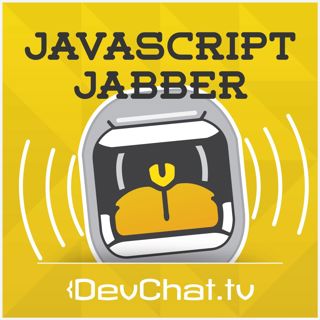
Exploring Local-First Applications and Data Synchronization Challenges: Part 1 - JSJ 654
Become a supporter of this podcast: https://www.spreaker.com/podcast/javascript-jabber--6102064/support.
22 Okt 20241h 35min

Slaughtering Sacred Cows: Reconsidering Software Dev Truisms - JSJ 653
Charles and Dan dive deep into the world of programming languages, development practices, and the trade-offs that shape our daily coding lives. Joining them is special guest Tomer Gabel, an experience...
15 Okt 20241h 45min

Unlocking Vue and Nuxt Potential: New Tools, Best Practices, and more - JSJ 652
In this episode, AJ and Steve dive deep into the world of Vue.js and API integration with a special guest, Daniel Kelly, a seasoned lead instructor at Vue School. this episode is packed with valuable ...
8 Okt 202458min

Interactive Coding Tutorials with Tomek Salkowski: Enhancing Developer Experiences - JSJ 651
AJ and Steve dive deep into the world of interactive coding tutorials alongside guest, Tomek Sułkowski. They kick off with a brief chat about the weather before delving into Tomek's expertise in creat...
1 Okt 202457min

Optimizing SQL and ORM Practices for High-Performance Applications - JSJ 650
In today's episode, Charles, Steve, and AJ, are joined by back-end engineer and team lead at Homebound, Stephen Haberman. We delve into the fascinating world of SQL c and its revolutionary approach to...
24 Sep 20241h 31min

Mentorship in Tech: Balancing Professionalism and Friendship for Maximum Growth and Accountability - JSJ 649
They dive deep into the world of mentorship, personal growth, and problem-solving with our special guests, Joao and Manny, alongside our insightful panelists, AJ and Charles.In this episode, they expl...
17 Sep 20241h 19min

Unpacking Deno 2: Code Stability, Free Speech, and more - JSJ 648
Today, Charles, Dan, AJ, and Steve dive into a range of fascinating discussions. Joining this episode is special guest, Ryan Dahl, the visionary creator behind Node.js and Deno.In this episode, they t...
10 Sep 20241h 34min

Opinionated Core Web Vitals - JSJ 647
Dan Shappir takes the lead this week to discuss Core Web Vitals and how Google is pushing the web to be faster.He leads Chuck, Aimee, and AJ through the ways that developers can measure and improve th...
3 Sep 20241h 10min






















